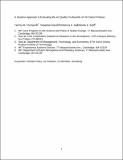A systems approach to evaluating the air quality co-benefits of US carbon policies
Author(s)
Thompson, Tammy M; Rausch, Sebastian; Saari, Rebecca K; Selin, Noelle E
DownloadAccepted version (2.874Mb)
Open Access Policy
Open Access Policy
Creative Commons Attribution-Noncommercial-Share Alike
Terms of use
Metadata
Show full item recordAbstract
Because human activities emit greenhouse gases (GHGs) and conventional air pollutants from common sources, policy designed to reduce GHGs can have co-benefits for air quality that may offset some or all of the near-term costs of GHG mitigation.We present a systems approach to quantify air quality co-benefits of US policies to reduce GHG (carbon) emissions. We assess health-related benefits from reduced ozone and particulate matter (PM2.5) by linking three advanced models, representing the full pathway from policy to pollutant damages. We also examine the sensitivity of co-benefits to key policyrelevant sources of uncertainty and variability. We find that monetized human health benefits associated with air quality improvements can offset 26-1,050% of the cost of US carbon policies. More flexible policies that minimize costs, such as cap-and-trade standards, have larger net co-benefits than policies that target specific sectors (electricity and transportation). Although air quality co-benefits can be comparable to policy costs for present-day air quality and near-term US carbon policies, potential co-benefits rapidly diminish as carbon policies become more stringent.
Date issued
2014-08-24Department
Massachusetts Institute of Technology. Joint Program on the Science & Policy of Global Change; Massachusetts Institute of Technology. Engineering Systems Division; Massachusetts Institute of Technology. Department of Earth, Atmospheric, and Planetary SciencesJournal
Nature Climate Change
Publisher
Springer Science and Business Media LLC
Citation
Thompson, T., Rausch, S., Saari, R. et al. A systems approach to evaluating the air quality co-benefits of US carbon policies. Nature Clim Change 4, 917–923 (2014).
Version: Author's final manuscript